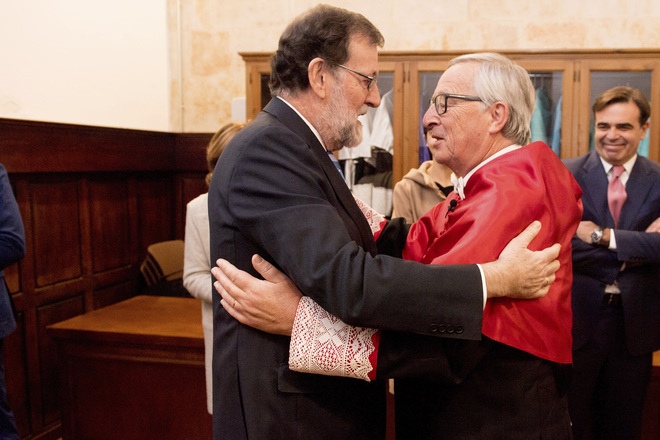Matthew Parish, 04.12.17
In politics, it is usual that things are not as they first appear. A dispute about the constitutional status of a region of Spain may transpire to have its origins in a crisis about the way the European Union is managed. A politician with a reputation for scandal at the top of the European Union may turn out to be an important factor in determining the trajectory of the Catalan autonomy movement.
Jean-Claude Juncker, one of the most outspoken critics of Catalan autonomy, is the Presi-dent of the European Commission. He took up this post in 2014. Before then, he had the most unusual career. He was Prime Minister of Luxembourg for 18 years from 1995 to 2013. He is the longest-serving European prime minister of modern times (if one discounts fascist dictators such as Spain’s Francisco Franco). He was the Luxembourg Finance Minister for even longer: from 1989 to 2013. When he was Prime Minister, held the second most important position in the Luxem-bourg government simultaneously.
From 2005 to 2013 Juncker was simultaneously President of Eurogroup, an informal but powerful meeting of the Eurozone’s finance ministers. In 2006 he was also President of the European Council (hence holding four jobs at the same time). Mr Juncker has always liked to keep him-self busy. He is one of the hardest-working members of the European bureaucracy, but he is also known as one of the most informal.
Juncker is accused of having been very drunk at several international meetings. He has been undiplomatic and intensely rude to European leaders. Incidents including slapping one in the face, calling another fat, kissing the bald forehead of a third, strangling a fourth and calling a fifth a dictator (the leader was a democratically elected member of Hungary, an EU member state). The man does many things that one might consider beneath the standards appropriate to a western European politician. This behaviour comes from a Luxembourger: one of the politest nations in Europe. Why does anyone put up with it?
Juncker has been repeatedly mired in scandal. He resigned as Prime Minister of Luxem-bourg amidst a scandal in which the Luxembourg intelligence services were discovered to have been wiretapping the Grand Duke of Luxembourg.
Then he was involved in a tax haven scandal, in which it emerged that European companies had been relocating to Luxembourg under his watch as finance minister. They had thereby reduced their corporation taxes to as little as 1%, even though they had no substantial connections with Luxembourg.
Juncker is a member of the Christian Social People’s Party (CSV), by far the dominant political party in Luxembourg since World War II. There is something strange about Luxembourg politics. If you have been a CSV Prime Minister of Luxembourg and you lose office or fall into disgrace, you may soon become President of the European Commission. The amount of time occupied by CSV ex-Prime Ministers as Presidents of the European Commission is remarkable in its compari-son to the time occupied by all the other (non-Luxembourger) Presidents of the Commission add-ed together.
Juncker has taken uncompromising positions on the Catalan nationalist movement, but he did not always do this. On 14 September 2017, he declared that the European Union would respect the outcome of the Catalan independence referendum to be held on 1 October 2017. Never-theless he asserted that Catalonia would have to apply to rejoin the European Union as a separate member state. This was not an unreasonable position.

By 13 October 2017, Juncker had changed his position. Now he said that Catalonia abso-lutely must not become independent. That is because, he explained, the European Union would become too complex to govern if it were full of small countries. Such a protest rings hollow coming from the former Prime Minister of the European Union’s smallest country, with a population of barely 400,000 people. Catalonia is closer to 8 million: a far more credible prospect for EU mem-bership by Juncker’s standards than Luxembourg. Luxembourg has the highest GDP per capita of any country in the European Union. That may be because by a long way Luxembourg is the biggest tax haven in the EU. This would be thanks to Juncker’s controversial work establishing it as the principal centre for European tax avoidance. Nevertheless his opposition to Catalonian autonomy is hypocritical.
On 26 October 2017 Juncker said that there were no human rights abuses by the Spanish state in Catalonia. He said this even though video had been aired showing paramilitary Police under the control of Madrid, beating voters and confiscating ballot boxes. He said this even though peaceful democratic politicians have been imprisoned without charge by courts based in Madrid under the control of a political party with origins in the fascist regime of Francisco Franco. On 10 November 2017 Juncker described Catalan nationalism as “poison”. On 19 November 2017 he said he unequivocally supported Madrid in the Catalan autonomy dispute. Madrid should be locking up peaceful democrats and the Police should be beating voters. Everyone should vote for Rajoy’s proxy parties in the forthcoming 21 December 2017 Catalan regional elections.
We need to investigate why Mr Juncker has adopted these opinions, and why they are so different from what he said before.
https://l-hora.org/?p=7317&lang=en
No comments:
Post a Comment